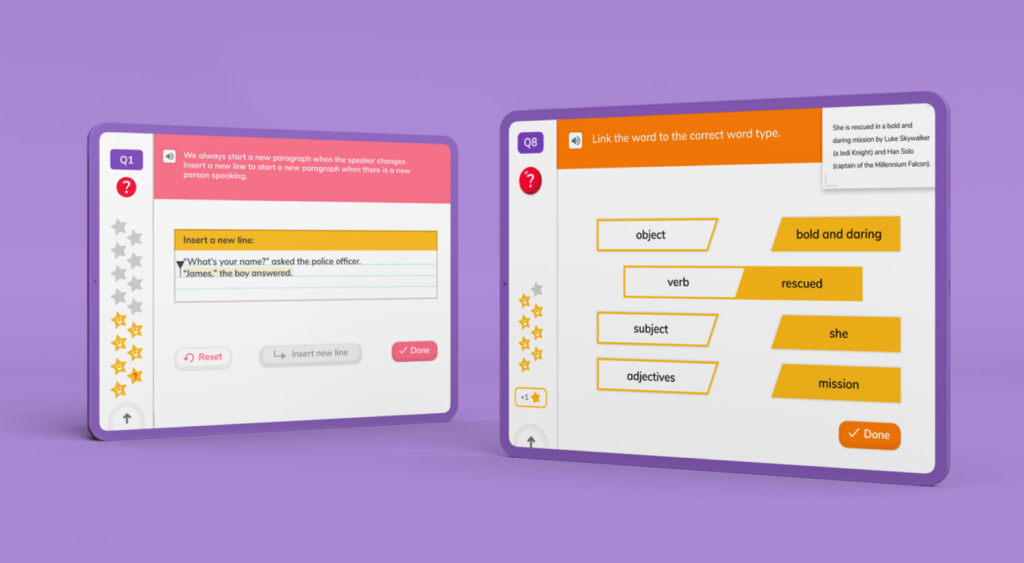

Learn what’s taught in the Upper Key Stage 2 English Curriculum across the subjects of reading, comprehension, writing, composition & grammar.

Author
Mhairi Sim
Published
August 2024


Learn what’s taught in the Upper Key Stage 2 English Curriculum across the subjects of reading, comprehension, writing, composition & grammar.

Author
Mhairi Sim
Published
August 2024


Learn what’s taught in the Upper Key Stage 2 English Curriculum across the subjects of reading, comprehension, writing, composition & grammar.

Author
Mhairi Sim
Published
August 2024


Key takeaways
Table of contents
There is one English curriculum for upper Key Stage 2 that spans Years 5 and 6. In the run-up to Year 6 SATs, there’s no doubt these are some pretty important years for our little learners! We’ve put together this fantastic guide to the Year 5 and Year 6 English curriculum so that you know just what’s in store for your kiddos.
Throughout Year 5 and Year 6 English curriculum students will cover aspects of reading, writing, and spoken language. Let’s take a closer look at each of these areas in more detail to see exactly what our learners are required to know at this stage!
By this stage in the English national curriculum, students should be confident and independent readers. They should be able to approach new texts and determine the meaning of unfamiliar words using their understanding of root words, prefixes, and suffixes they’ve build over the years.
Throughout upper Key Stage 2, a large focus of English learning shifts to reading comprehension. To this end, there are many skills to brush up on and new ones to cover in the Year 6 and Year 5 national curriculum English programme!
As in previous years, students will be encouraged to read a wide selection of texts across different formats and genres. They’ll be encouraged to identify themes in books and discuss what they’ve read with their peers.
Throughout the English national curriculum in Year 5 and Year 6 learners are asked to show that they understand what they’ve read by employing a range of reading strategies such as:
In addition to all of this, our Year 6 and Year 5 English curriculum learners also explore how authors use language to impact the reader. This includes the use of figurative language and different styles of writing, such as persuasive writing.
They’ll be able to distinguish between facts and opinions and learn methods for retrieving, recording, and presenting information. Students then use these skills in debates and discussions, where they’ll need to justify their views.
Unlock unlimited English questions
Put your skills to the test with fun exercises + learning games that are proven to boost ability!
DoodleEnglish is an app that’s filled with thousands of fun, interactive exercises covering grammar, punctuation, spelling and more!
Designed by teachers, it creates each child a unique work programme tailored to their needs, boosting their confidence and skills in English. Try it for free today!

Throughout the upper stage 2, students focus on improving their writing skills. They’ll continue their work in spelling, vocabulary, grammar, and punctuation, and will learn new key skills in how to compose their writing.
With their handwriting well formed by now, the majority of Year and Year 6 students will spend these years focusing on the spelling element of transcription.
They’ll continue to work on prefixes and suffixes, and identifying homophones. All of which help them spell a range of words.
The Year 5 and Year 6 English national curriculum also requires the use of dictionaries to check the spelling and meaning of words. They’ll also learn how to use a thesaurus.
During their upper Key Stage 2 years, learners will be taught to compose their writing in three main stages; planning, writing, and evaluating.
During the planning phase, learners will be encouraged to:
Next, in the drafting and writing stage, students will:
Finally, when reviewing and editing their work, Year 5 and 6 students should aim to:
Vocabulary, grammar, and punctuation are all important parts of ensuring that pieces of writing are easy to understand. To that end, it’s a no-brainer that our Year 5 and Year 6 national curriculum English students will spend time perfecting this aspect of their writing skills during the upper Key Stage 2.
In their writing, learners should be able to use vocabulary and sentence structures including:
By the end of the year, students should also be able to identify and use various forms of punctuation for various purposes throughout their written work. These include:
A key element of the English curriculum is spoken language. This element is all about developing a learners’ abilities to speak to and listen to others.
The curriculum for spoken language spans Year 1 – Year 6 with teachers being advised to teach the content to a suitable level for their learners.
Learners should be encouraged to listen and respond, build their vocabulary, stay on topic during discussions, speak in a tone and volume suitable for their audience and more.
English students in upper Key Stage 2 work hard to prepare for the Key Stage 2 reading SATs. These statutory exams take place at the end of the English Year 6 national curriculum, in May.
The English element of these exams focuses on learners’ spelling, punctuation, grammar, and reading comprehension. To learn more about these important assessments, check out our page on the KS2 SATs!
It’s also worth noting that some schools in England may give students an opportunity to sit the 11+ exam to gain entry into academically selective high schools. These exams usually take place at the start of Year 6, within the first two weeks of September.
As a teacher, the one thing I always recommend is for my students to get into the regular habit of reading! I find that when it comes to a learners’ reading and writing skills, I can always tell which kids are reading regularly at home and which kids aren’t.
Reading a range of texts (including ones that challenge our kids) allows them to build skills in almost every area of the English curriculum. They’ll build their vocabulary, notice how words are spelt, and see how language and sentence structure can be used in a variety of ways. This also helps them gain a better understanding of what they’re reading and gives them ideas they can use in their own writing!
Speaking of writing, encourage your learners to write whenever you can, Create shopping lists, write out birthday cards, thank you cards, or a review of their favourite restaurant! Some kiddos might prefer to keep a diary. I also like these story dice that prompts them to come up with a new work of fiction!
Another fabulous option is a pen pal. There are a bunch of amazing places you can go online to find a pen pal for your child, but one I love and have used a lot with kids in my own classes is Post Pals!
As the KS2 SATs are lined up to take place at the end of Year 6, learners can also benefit from more targeted skills revision. This is where our amazing DoodleLearning English app comes into its own!
Our app has thousands of games and activities that are fully aligned with the English curriculum, created to boost learners’ confidence and ability. The app will create a personalised programme of work for each learner to make sure they’re covering all the right bases for their own learning journey!
The upper KS2 years are super important since they are the last chance for learners to master the fundamental English skills needed to thrive in secondary school. We’ve outlined everything you need to know about the Year 5 and 6 English curriculum so your child has the best chance to succeed!
Remember, to support your child, try out the tips we’ve outlined above to ensure they’re fully equipped to tackle these final primary school years with confidence!
Book a chat with our team
If you’d like to use Doodle’s browser version, please visit this page on a desktop.
To log in to Doodle on this device, you can do so through our apps. You can find out how to download them here: